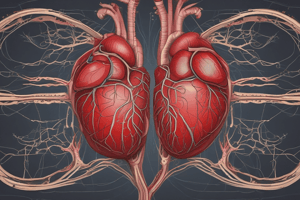Podcast
Questions and Answers
What is the function of blood related to the transport of regulatory molecules?
What is the function of blood related to the transport of regulatory molecules?
- Blood carries hormones and enzymes that regulate body processes (correct)
- Blood regulates the body's pH and osmosis
- Blood helps in the clot formation process
- Blood transports waste products from cells to the kidneys
How does blood contribute to the maintenance of body temperature?
How does blood contribute to the maintenance of body temperature?
- Heat generated by metabolism warms the blood, which is then transported to the body's surface to release heat (correct)
- Blood carries hormones and enzymes that regulate body processes
- Blood helps in the clot formation process
- Blood transports waste products from cells to the kidneys
What is the liquid matrix of blood called?
What is the liquid matrix of blood called?
- Lymph
- Interstitial fluid
- Plasma (correct)
- Serum
What does 'blue bloods' represent in relation to blood?
What does 'blue bloods' represent in relation to blood?
How does blood protect against foreign substances?
How does blood protect against foreign substances?
Flashcards are hidden until you start studying
Study Notes
Blood Functions in Transport
- Blood serves as a transport system for regulatory molecules, including hormones and enzymes, which help regulate various bodily functions.
- These regulatory molecules travel through the bloodstream, allowing for communication between different organs and tissues.
Blood and Body Temperature Regulation
- Blood contributes to the maintenance of body temperature through the process of thermoregulation.
- It redistributes heat by adjusting blood flow to the skin; increased flow in warm conditions and reduced flow in cold conditions to conserve heat.
Liquid Matrix of Blood
- The liquid matrix of blood is called plasma.
- Plasma comprises about 55% of total blood volume, containing water, electrolytes, proteins, hormones, and waste products.
Meaning of 'Blue Bloods'
- The term 'blue bloods' refers to individuals from noble or aristocratic backgrounds.
- It originates from the visibility of veins through fair skin, often associated with higher social status in historical contexts.
Blood's Role in Immune Protection
- Blood protects against foreign substances using white blood cells and antibodies.
- White blood cells identify and neutralize pathogens, while antibodies bind to specific antigens to facilitate their removal from the body.
Studying That Suits You
Use AI to generate personalized quizzes and flashcards to suit your learning preferences.





